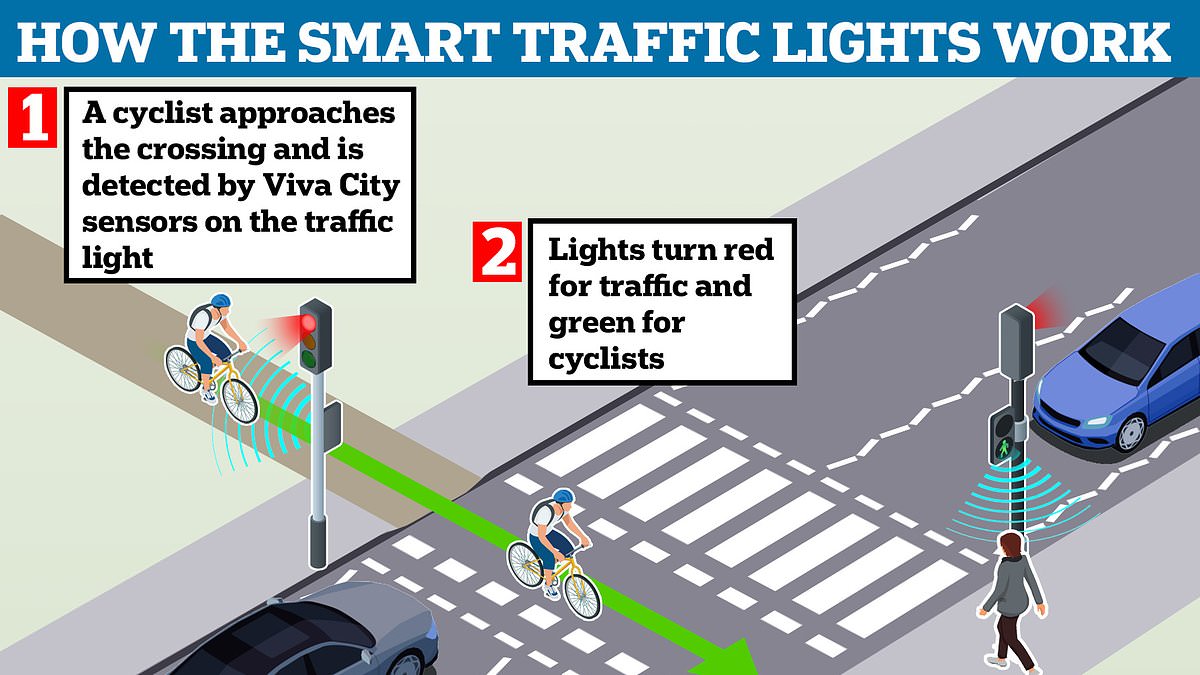A council has installed AI technology at a toucan crossing to give cyclists ‘uninterrupted journeys’ by automatically turning lights red for cars.
The crossing – also used by pedestrians – will use sensors to detect riders up to 30m away and change the lights so those on bikes can cross the road.
Transport for West Midlands and Solihull Council installed the new tech on A34 Stratford Road near Blythe Valley, Birmingham.
Developed by VivaCity, the sensors aim to promote active travel and prioritise cyclists over motor vehicles in the next step in what has been dubbed the ‘war on motorists’.
The council claims that by detecting cyclists earlier, the sensors both help reduce the chance of collisions and reduce waiting times at crossings.
This pilot is expected to serve as a model for future projects aimed at ‘reducing vehicle dependency’ in the West Midlands.
Mark Nicholson, the chief executive of VivaCity, told The Times that AI can identify what it sees ‘without any personal information’.
The council can then build an algorithm for that junction to say cyclists or pedestrians are to be prioritised at certain times, like at 3pm when children are walking home from school.
Transport Secretary Louise Haigh said the Labour government plans to invest ‘unprecedented levels of funding’ in active travel to reduce the burden on the NHS.
She said she wanted to ‘end the culture wars’ over transport policy but shadow transport secretary Helen Whately said Labour seemed unable to take a ‘common sense approach to transport’.
Richard Parker, Mayor of the West Midlands and WMCA chair, said: ‘Road safety is a top priority for me, and I want everyone to feel secure when cycling or walking. This project gives us a chance to see how Artificial Intelligence can make our roads safer by detecting cyclists and pedestrians and manage traffic signals to give them more time to cross safely.
‘This is just one part of my plan to make our streets safer and encourage more people to cycle, meaning improved fitness, fewer traffic jams and cleaner air.’
Solihull Council’s Cabinet Member for Environment and Infrastructure, Cllr Ken Hawkins, said: ‘We want to do all that we can to encourage people to travel safely and sustainably across the borough.
‘The new sensors will help make the Monkspath to Blythe Valley active travel route a more attractive option for cyclists so they can travel quickly but safely on this key route.’
Peter Mildon, COO of VivaCity, said: ‘We’re excited to see our technology being used to support active travel initiatives in Solihull. Our smart sensors are specifically designed to enhance the efficiency and safety of road networks.
‘Our aim is to set a new standard of road safety across the UK, including in the West Midlands. We are dedicated to making journeys safer for everyone and look forward to continued collaboration with TfWM.’
It comes after the announcement that AI speed cameras that can ‘spy inside’ cars will be rolled out across the UK to catch drivers using mobile phones or failing to wear seatbelts.
The new technology will allow police to both crack down on motorists who are ‘distracted’ by mobile phones and catch speeding drivers using the same cameras.
Transport chiefs are rolling out the cameras as Department for Transport research suggests up to 400,000 British drivers are still using handheld devices illegally while behind the wheel.
However privacy campaigners reacted with fury to proposed widespread use of AI cameras – blasting the ‘intrusive and creepy’ tech that treats everybody as a suspect.
About a quarter of all police forces across the UK are already deploying cameras that can catch drivers using a mobile phone – punishable by up to six penalty points and a £1,000 fine.
And 11 police forces have also deployed roadside AI cameras, made by n tech firm Acusensus, that capture high-quality images of vehicles as they pass.
The high-tech cameras take two images of a driver – one at a shallow angle to see if they have a phone at their ear and one at a steep angle to see if a device is on their lap.
New artificial intelligence software then analyses the images and flags if a driver is using a mobile or not wearing a seatbelt – with ‘violation packages’ then sent to police who can prosecute the driver.
Police forces taking part in a trial of the cameras with National Highways include Durham Police, Greater Manchester, Thames Valley, Sussex and Warwickshire.
To counter privacy concerns, police say the pictures are anonymised to removed identifying features such as number plate, passengers or make of the vehicle. The images are only matched to registration details if a driver is prosecuted.
